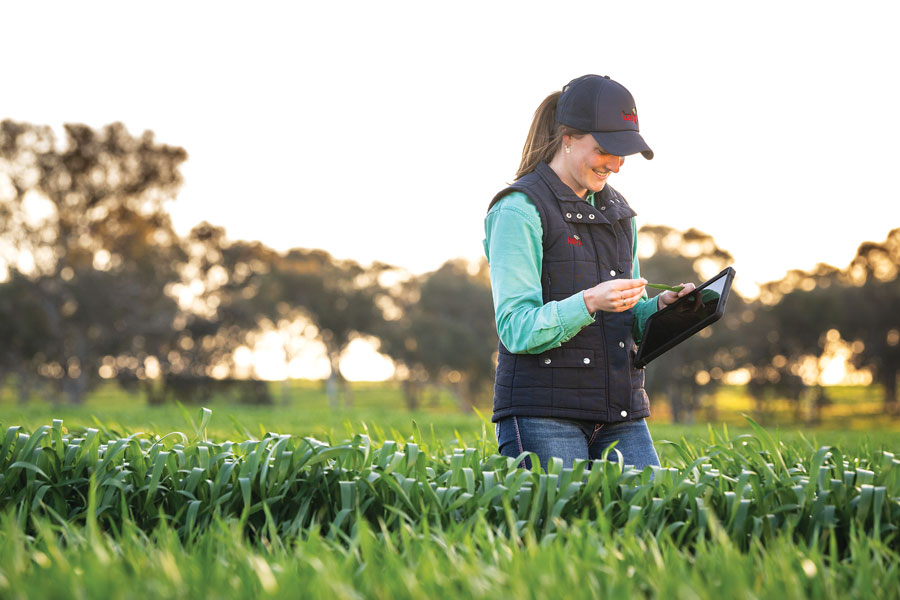Key points
- Trial service providers are essential for GRDC’s National Variety Trials (NVT)
- There are 13 trial service providers across Australia engaged in the NVT
- They select sites, as well as plant, maintain, assess and harvest trial crops across the country, feeding all the data into the NVT portal for analysis by statisticians
For the past 20 years a nationwide network of trial service providers has allowed GRDC’s National Variety Trials (NVT) to function year after year.
The network includes private companies such as Kalyx Australia, grower groups such as Southern Farming Systems (SFS), and state departments such as the Department of Primary Industries and Regions (PIRSA) through the South Australian Research and Development Institute (SARDI). There are trial service providers across Australia engaged in the NVT.
Kalyx has been an NVT partner since 2005 and now has a team of up to 100 permanent staff, plus seasonal staff, who select sites as well as plant, maintain, assess and harvest trial crops across the country, feeding all the data into the NVT portal for analysis by statisticians.
In south-west Victoria, SFS manages dozens of trials across sites at Hamilton, Inverleigh and Streatham, testing a wide range of crops including wheat, barley, oats, canola and faba beans.
SFS senior research and extension officer Audrey Gripper says the five-year contracts provide the stability to hire and train staff and ensure continuity.
“The NVT complement the other trials and project work we do,” she says.
We can use newer, high-performing varieties in fungicide or plant density trials to look more in-depth at what management works best for our area.
SARDI manages more than 100 trials in South Australia. Agronomy program leader Associate Professor Rhiannon Schilling says the diversity of environments ensures the trials capture a wide range of data to reflect variability across the state’s main cropping regions.
Independent data source
For two decades, the NVT have provided Australian grain growers with independent, region-specific data on crop performance, helping them make informed decisions about variety selection.
Its roots stretch back as far as the 1960s to programs such as the WA Department of Agriculture Crop Variety Testing (CVT) and other evaluation programs such as those run in SA in the 1980s by Rob Wheeler.
By 1994, when Plant Breeder’s Rights were legislated, commercial operators were beginning to take over from mostly government and institution-based plant breeding programs.
Companies such as Kalyx played a crucial role in those early stages. Kalyx managing director Ashley Bacon recalls their involvement during the NVT’s infancy.
“We were providing trial variety evaluation services to GRDC from the mid to late 1990s, under the CVT program, and it was out of that the NVT evolved,” he says.
Now covering all the major cropping regions, the goal is clear: to provide independent, unbiased data on the performance of new varieties of cereal, pulse and oilseed crops.

Kalyx research agronomist Nell Bate. Companies like Kalyx have placed a crucial role in NVT’s early stages. Photo: supplied by Kalyx
Challenges and opportunities
Running such a large-scale national program is not without challenges. From weather conditions to logistical hurdles, trial service providers must navigate a complex set of variables each year.
SARDI senior agricultural officer John Nairn says each year brings different seasonal conditions, just like on growers’ properties, including late breaks, drought and frost.
Mr Bacon says one of the unique challenges in managing NVT is their spread across all production areas to represent the needs of all growers. This is typically not the case for privately funded trial programs.
“Growers understandably want to see the trials that they have helped fund conducted close to their own farms,” he says.
“At times, this can be a challenge, but it is no different to what farmers face and our national footprint helps us manage the cost and risk associated with this.”
COVID-19 imposed additional novel problems, with restrictions affecting travel and access to sites. However, service providers adapted, working closely with GRDC to maintain their essential services status and implement safety protocols so the trials could continue.
Ms Gripper joined SFS in March 2020, just as the pandemic struck. “When I started, we couldn’t run any field days and I pretty much went a year without meeting anyone, so it’s been great to get out and talk to people the last two years,” she says.
Industry-wide impact
The independent data generated by the NVT is invaluable to growers, offering insights into how different varieties perform in local environments. One of the key strengths of the program is its region-specific focus, allowing growers to see how varieties fare in conditions similar to their own.
“The trials are a great drawcard for growers because they are so region-specific,” Ms Gripper says. “Growers are always interested in seeing the top-performing varieties.”
Field days, crop walks and other outreach activities help bridge the gap between trial data and practical on-farm decision-making about which varieties to invest in.
The sheer volume of data generated over the years provides a robust resource that does not just benefit growers. Plant breeders and consultants across the country rely on NVT results to guide their recommendations.
“Breeding companies refer back to NVT data when showcasing their varieties,” SARDI’s Mr Nairn says. “It’s trusted in the industry because it’s independent.”
Looking to the future
As the NVT moves into its third decade, the partnerships between GRDC, service providers and growers remain critical.
“It’s the highest profile trial program in Australia, and potentially the world,” Kalyx’s Mr Bacon says.
“NVT deserves a massive congratulations on getting to 20 years, and we really look forward to continuing to partner with GRDC on this.”
More information: National Variety Trials

























































